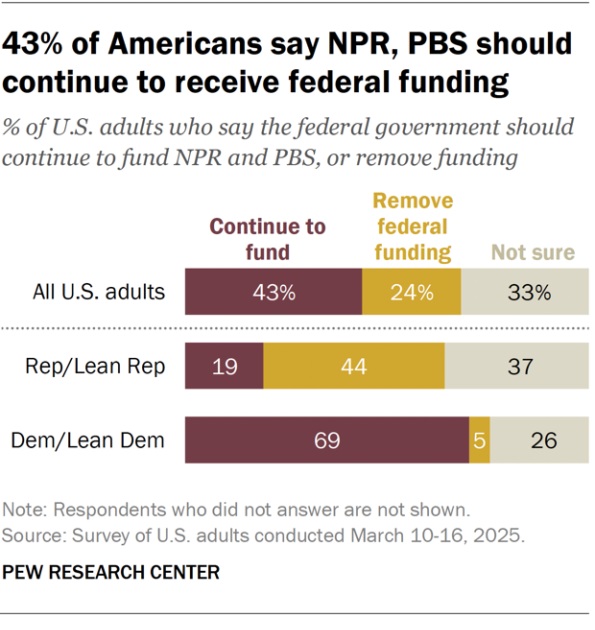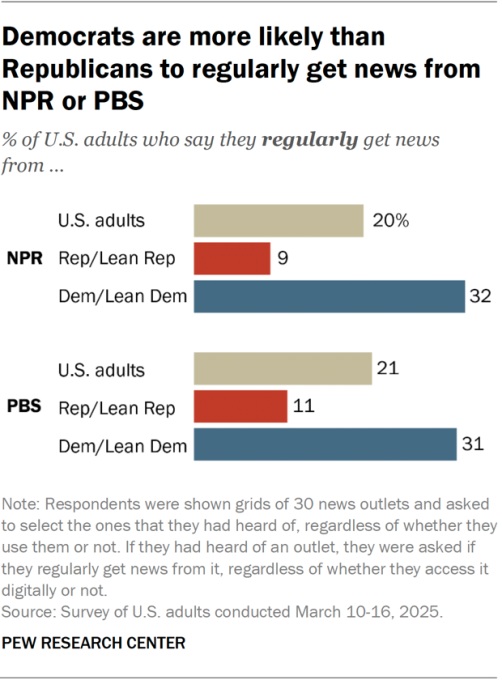WASHINGTON – In March 2023, Representative Ronny Jackson (R-TX-13) introduced a bill in the US.S House eliminating financial support to both affiliates of NPR and public television’s Public Broadcasting Service (PBS) from the U.S. government. The bill was referred to the Subcommittee on Communications and Technology, where it essentially died.
In April 2024, Representative Jim Bank (R-IN-3) introduced to the US House H.R. 8083 or the “Defund NPR Act.” As the bill notes, its purpose is to prohibit “federal funds from being made available to or used to support National Public Radio (NPR) or its successor organization, including federal funds that a public broadcast station pays to NPR as dues or to purchase NPR programming.”
Now, on March 27, 2025, Rep. Ronny Jackson has introduced a somewhat expanded version of the previous legislation attempts. H.R. 2443, now called the “No NPR and PBS Act” would prohibit U.S. government funding of either network.

Briefly, the Corporation for Public Broadcasting (CPB), established by Congress in 1967, is the primary conduit for federal funding to public media outlets in the United States, including NPR (National Public Radio) and PBS (Public Broadcasting Service). For the fiscal year 2025, Congress appropriated $535 million to CPB.
It’s important to note that federal funding constitutes a relatively small portion of NPR and PBS’s overall budgets. Approximately 10% of public radio stations’ revenue comes from federal sources, primarily through CPB. Similarly, PBS relies on a combination of member station fees, corporate and individual donations, and federal appropriations. Therefore, while federal funding plays a crucial role in supporting public broadcasting, NPR and PBS also depend significantly on other revenue sources to fund their operations.
H.R. 2443 has received about a dozen co-sponsors, including Reps. Jodey Arrington (R-TX), Andy Biggs (R-AZ), Tim Burchett (R-TN), Michael Cloud (R-TX), Mike Collins (R-GA), Neal Dunn (R-FL), Paul Gosar (R-AZ), Troy Nehls (R-TX), Chip Roy (R-TX), Keith Self (R-TX) and Randy Weber (R-TX).
The “Department of Government Efficiency” (DOGE) Subcommittee Chairwoman Marjorie Taylor Greene (R-GA14) was critical of public media funding last week during a hearing that featured the heads of both NPR and PBS.
“As my DOGE subcommittee hearing showed, these taxpayer-funded PR arms of the Democrat Party don’t deserve the American people’s hard-earned money,” Taylor Greene said. “NPR and PBS hate President Trump, his supporters, and the majority of Americans who sent us a mandate in 2024. They can hate us on their own dime.”
Meanwhile, as the bill gains traction in Congress, a Pew Research survey shows that most Americans oppose cutting off support. The survey, conducted from March 10-16, 2025, found that 43% of respondents believe Congress should continue funding NPR and PBS, compared to 24% who think funding should end. About one-third of those surveyed remain unsure.
Political affiliation strongly influences attitudes toward public media funding. Nearly 69% of Democrats support continued federal funding, whereas only 19% of Republicans share that view. Instead, 44% of Republicans favor ending government support. Among Republicans aged 50 and older, opposition to public media funding is particularly pronounced. By contrast, only 5% of Democrats advocate cutting funding.
Media consumption habits also play a role in these opinions. Pew reports that about 20% of U.S. adults say they regularly get news from NPR, while 21% regularly watch PBS. However, Democrats are more likely than Republicans to consume public media. According to the survey, 32% of Democrats regularly get news from NPR, compared to just 9% of Republicans. Similarly, 31% of Democrats watch PBS for news, nearly three times the 11% of Republicans who do so.

Trust in public media also differs sharply along partisan lines. While 47% of Democrats trust NPR as a news source, only 12% of Republicans agree, with 26% of Republicans actively distrusting NPR. The divide is similar for PBS: 59% of Democrats express trust in PBS as a news source, while only 23% of Republicans say the same.

A similar story surrounds Voice of America and affiliates like Radio Free Europe and Radio Free Asia. A federal judge halted the Trump administration’s effort to dismantle the U.S. government-funded international news service, calling it “arbitrary and capricious.” Judge James Paul Oetken blocked the U.S. Agency for Global Media, which oversees Voice of America (VOA), from firing over 1,200 staff or closing offices. The order also prevents cutting grant funding to the outlets. The agency had attempted to cut funding following Trump’s directive aimed at shrinking government and aligning it with his agenda.
Plaintiffs, including VOA journalists, labor unions, and Reporters Without Borders, sued to stop the cuts, arguing the shutdown violated previous court findings that VOA journalists are protected from White House interference. Critics argue the cuts leave a vacuum filled by propagandists. Trump and his allies have accused VOA of leftist bias and failing to promote pro-American values, despite its mandate to operate as a non-partisan news organization.
Voice of America, established during World War II to counter Nazi propaganda, has been a tool of U.S. soft power. It played a significant role in the Cold War by providing news to authoritarian countries. The agency’s news website has not been updated since the cuts, and many staff members have been locked out of agency systems.
Kari Lake, a special adviser, defended the cuts, claiming the administration aims to align the agency with “American values” and reduce what she called “anti-American garbage.” Additional lawsuits challenging the cuts are pending, and Oetken’s ruling delays further actions until the cases are resolved.

Margot Adler
There is also a Pagan connection. Margot Adler, who crossed the Veil in 2014, was an American journalist, author, lecturer, and prominent Witch and priestess in the Pagan and Wiccan communities. She is best known for her work as a National Public Radio (NPR) correspondent for over three decades. She was a member of Covenant of the Goddess and played a vital role in advocating not only for NPR but also for our community establishing our own news sources. Her relationship with NPR also brought many of our community’s stories into the mainstream, especially during a time when unbiased coverage of our community was challenging.
Adler’s legacy continues through her contributions to journalism, religious studies, and the Pagan community.
NPR and PBS leaders faced tough questioning during a House subcommittee hearing over federal funding, but the debate remained unchanged. NPR President/CEO Katherine Maher acknowledged NPR’s past failures to include conservative viewpoints but argued continued funding is essential for local stations, especially in rural areas where federal dollars make up to half of their budgets.
Maher emphasized that losing funding would be “incredibly damaging” to public radio, especially as local news outlets are shutting down at a rate of more than two per week. The federal budget allocates $535 million annually for public media, including $121.5 million for public radio stations. Republicans argue this spending is unnecessary amid a $36 trillion national debt and a media landscape with numerous news options.
Rep. William Timmons (R-SC) stated that public media’s role needs reevaluation, while Rep. Greg Casar (D-TX) dismissed financial concerns as a cover for ideological opposition, criticizing Republicans for targeting public media instead of large corporations.
Discussion largely focused on perceived political bias. Rep. James Comer (R-KY) claimed that NPR had become propaganda, while Subcommittee Chair Marjorie Taylor Greene (R-GA) accused NPR and PBS of catering to “wealthy white urban liberals” and ignoring rural America.
Maher countered that NPR is working to include conservative perspectives by hiring analysts to track coverage and ensuring direct access to policymakers. She admitted errors were made in the handling of some coverage, such as the Hunter Biden laptop story, but said NPR’s editorial processes have improved.
Despite Maher’s assurances, Taylor-Greene concluded the hearing by calling for the complete defunding and dismantling of the Corporation for Public Broadcasting.
Editorial Note: The Wild Hunt objects to all attempts to defund public media. In Adler’s words, “I think we have to keep true to the anti-authoritarian, pluralistic spirit at the heart of contemporary Paganism. It is truly an antidote to the authoritarian religions of our time. “
The Wild Hunt is not responsible for links to external content.
To join a conversation on this post:
Visit our The Wild Hunt subreddit! Point your favorite browser to https://www.reddit.com/r/The_Wild_Hunt_News/, then click “JOIN”. Make sure to click the bell, too, to be notified of new articles posted to our subreddit.